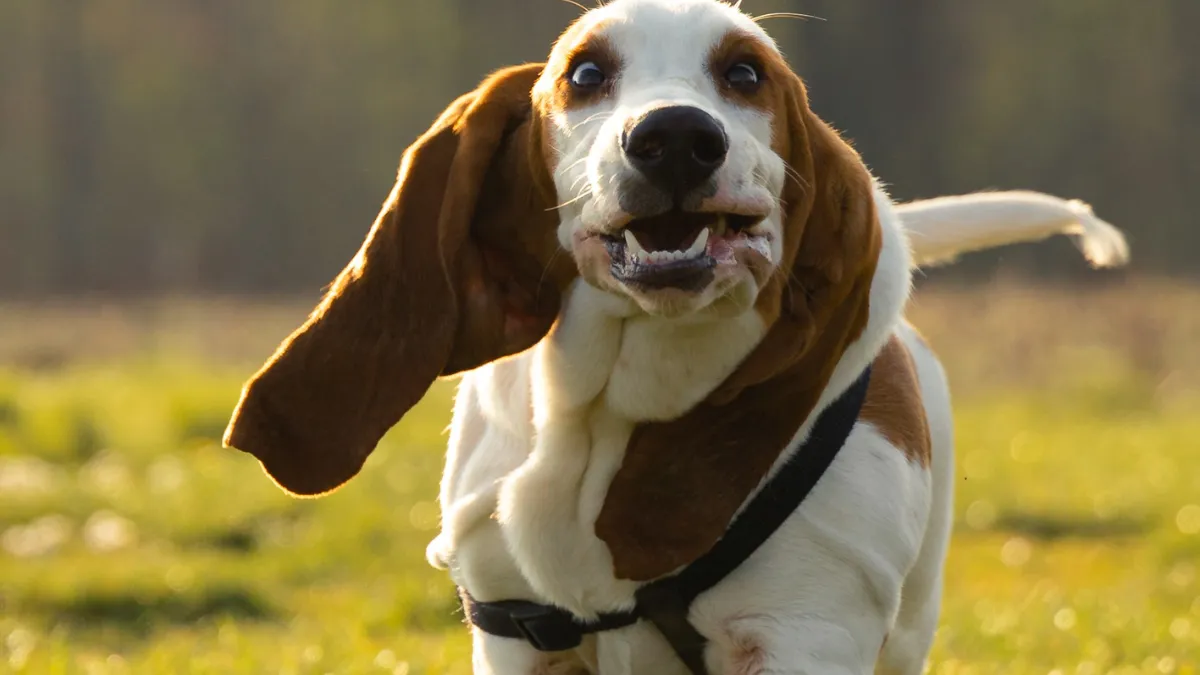Basset Hounds, cherished for their endearing features, are generally robust dogs, yet certain health problems are more prevalent in this breed. In this discussion, we delve into the question: "Do Basset Hounds have health problems?" Exploring common health issues, we aim to provide insights into the well-being of these beloved hounds throughout their lives.
One of the most well-known health issues in basset hounds is their tendency to develop back problems. Due to their long and low bodies, basset hounds are at a higher risk for intervertebral disc disease (IVDD). This condition occurs when the discs between the vertebrae in the spine become damaged or rupture, causing pain and sometimes paralysis. It is important for basset hound owners to be aware of the signs of IVDD and to seek veterinary care immediately if they suspect their dog may be affected.

In addition to back problems, basset hounds may also be prone to certain eye issues. For example, they may be at a higher risk for developing glaucoma, a condition in which pressure builds up in the eye and can lead to blindness if left untreated. Other eye issues that may affect basset hounds include cataracts and entropion, a condition in which the eyelid rolls inward and causes irritation. Basset hound owners need to have their dog's eyes checked regularly by a veterinarian to catch any potential problems early.
Breed Overview
Basset Hounds are a popular breed of dog that is known for their long ears, short legs, and droopy eyes. They are a member of the hound group, and they were originally bred in France to hunt small game. Basset Hounds are a friendly and affectionate breed, but they can also be stubborn at times.
Origins and Characteristics
The Basset Hound is thought to have been developed from the Bloodhound and other French hounds in the 16th century. The breed was originally used to hunt rabbits and other small game, and their short legs and long ears were bred to help them track scents close to the ground.
Basset Hounds are a medium-sized breed, typically weighing between 40 and 65 pounds. They have short, smooth coats that come in a variety of colors, including black, white, tan, and red. Basset Hounds are known for their distinctive baying howl, which they use to communicate with their owners and other dogs.
Temperament and Behavior
Basset Hounds are known for their friendly and affectionate personalities. They are great with children and other pets, and they love to be around people. However, Basset Hounds can also be stubborn at times, which can make training a challenge.
Basset Hounds are also known for being noisy. They have a tended, baying howl that they use to communicate with their owners and other dogs. This can be a problem if you live in an apartment or have close neighbors.
Overall, Basset Hounds are a great breed for families and individuals who are looking for a friendly, affectionate, and loyal companion. However, they do have some health problems that potential owners should be aware of, including hip dysplasia, ear infections, and obesity.

Common Health Issues
Basset Hounds are generally healthy dogs, but they are prone to certain health issues. Here are some common health problems that Basset Hounds may face:
Orthopedic Conditions
Basset Hounds are susceptible to joint problems, such as arthritis, elbow dysplasia, and hip dysplasia. These conditions can cause pain, lameness, and difficulty moving around. Obesity can exacerbate these issues, so it is important to keep your Basset Hound at a healthy weight.
Skin and Coat Problems
Basset Hounds tend to develop skin conditions, such as seborrhea and allergies. Seborrhea is a skin disorder that causes excessive scaling and greasiness of the skin, while allergies can cause itching, redness, and infection. Regular grooming and a healthy diet can help prevent these issues.
Ocular Disorders
Basset Hounds are prone to certain eye conditions, such as glaucoma, entropion, and ectropion. Glaucoma is a condition that causes increased pressure within the eye, while entropion and ectropion are eyelid disorders that can cause irritation and infection. Regular eye exams can help detect these issues early.
Ear Infections
Basset Hounds have long, floppy ears that can trap moisture and debris, making them prone to ear infections. Symptoms of an ear infection include redness, odor, and discharge. Regular ear cleaning and proper drying can help prevent these infections.
In conclusion, Basset Hounds are generally healthy dogs, but they are prone to certain health issues. By maintaining a healthy weight, providing proper grooming and diet, and seeking regular veterinary care, you can help keep your Basset Hound healthy and happy.
Preventative Health Care
When it comes to ensuring the health and well-being of a Basset Hound, preventative care is key. By taking proactive steps to maintain their health, owners can help prevent many common health issues that Basset Hounds are prone to. Below are some important areas to focus on when it comes to preventative health care for Basset Hounds.
Diet and Nutrition
A balanced diet is essential for the overall health of a Basset Hound. It's important to feed them high-quality dog food that is appropriate for their age, weight, and activity level. Owners should avoid feeding their Basset Hounds table scraps or human food, as this can lead to obesity and other health issues.
Exercise and Activity
Basset Hounds are known for their love of lounging, but regular exercise is important for their health. Owners should aim to provide their Basset Hounds with at least 30 minutes of exercise each day, such as walks or playtime in a fenced-in yard. This can help prevent obesity and other health issues.
Regular Veterinary Visits
Regular visits to the veterinarian are essential for maintaining the health of a Basset Hound. Owners should take their Basset Hounds to the vet for annual check-ups, vaccinations, and preventative care. This can help catch any potential health issues early on and prevent them from becoming more serious.
Overall, preventative care is crucial for ensuring the health and well-being of a Basset Hound. By focusing on diet and nutrition, exercise and activity, and regular veterinary visits, owners can help prevent many common health issues and keep their Basset Hounds healthy and happy.
Genetic Disorders and Inherited Diseases
Basset Hounds are predisposed to certain genetic disorders and inherited diseases. These conditions can be passed down through generations and can be a cause of concern for potential owners. Below are some of the most common genetic disorders and inherited diseases that affect Basset Hounds.
Blood and Circulatory Issues
Basset Hounds are prone to a blood clotting disorder called thrombophilia. This condition affects the platelets in the blood, which can lead to excessive bleeding. Basset Hound thrombopathy is a specific type of thrombopathia that affects only this breed. Basset Hounds need to be tested for this condition before breeding.
Gastric torsion, also known as bloat, is another common issue in Basset Hounds. This condition occurs when the stomach twists on itself, causing a blockage in the digestive system. Owners need to recognize the symptoms of bloat and seek medical attention immediately as it can be life-threatening.
Neurological and Spinal Conditions
Wobbler syndrome is a condition that affects the cervical spine of Basset Hounds. It is characterized by a narrowing of the spinal canal, which puts pressure on the spinal cord. This can lead to weakness, difficulty walking, and even paralysis. Basset Hounds with wobbler syndrome may require surgery to correct the issue.

Intervertebral disc disease is another spinal condition that affects Basset Hounds. This condition occurs when the discs between the vertebrae of the spine become damaged or degenerate. It can cause pain, weakness, and even paralysis. Treatment options may include medication, rest, or surgery.
Other inherited conditions that may affect Basset Hounds include osteochondritis dissecans, a joint disorder that affects the development of cartilage, and panosteitis, a bone disorder that causes pain and lameness.
It is important for potential owners to be aware of these genetic disorders and inherited diseases when considering a Basset Hound as a pet. Regular veterinary check-ups and proper care can help manage these conditions and ensure the health and well-being of the dog.
Behavioral and Environmental Factors
Stress and Anxiety
Basset Hounds are generally easy-going and affectionate dogs. However, they can be prone to stress and anxiety, especially when they are left alone for extended periods. Separation anxiety is a common issue among Basset Hounds and can lead to destructive behavior such as chewing, digging, and barking excessively. Therefore, it is important to provide them with plenty of attention and mental stimulation to prevent boredom and anxiety.
Living Conditions
Basset Hounds can adapt to various living conditions, but they thrive in homes with a fenced yard where they can explore and exercise. They are not suitable for apartments or small living spaces, as they require ample room to move around and stretch their legs. Basset Hounds also enjoy hunting and tracking activities, so providing them with toys and puzzles that simulate these activities can help keep them mentally stimulated and prevent boredom.
When getting a Basset Hound puppy, it is important to socialize them early on to help prevent behavioral issues later in life. They should be exposed to different people, animals, and environments to help them become well-rounded and confident adults.
Overall, while Basset Hounds can be prone to stress and anxiety, providing them with a suitable living environment and plenty of mental stimulation can help prevent these issues.

Health Management and Recovery
Treatment Options
Basset Hounds are prone to several health issues, including chronic degenerative disorders, trauma, and paralysis. When it comes to treating these conditions, it is important to seek the advice of a veterinarian. The vet will examine the dog and recommend the best course of treatment. Depending on the condition, treatment options may include medication, surgery, or physical therapy.
For chronic degenerative disorders, such as arthritis, medication can help manage the pain. Non-steroidal anti-inflammatory drugs (NSAIDs) are commonly prescribed to reduce inflammation and provide pain relief. In some cases, surgery may be necessary to correct structural abnormalities that are causing the condition.
In the case of trauma or paralysis, immediate veterinary attention is necessary. The vet will assess the extent of the injury and recommend the appropriate treatment. This may include surgery, medication, or physical therapy to help the dog regain mobility.
Caring for a Recovering Basset Hound
After treatment, it is important to provide proper care for a recovering Basset Hound. This includes monitoring the dog for any signs of pain or discomfort, providing a comfortable and supportive environment, and following any medication or physical therapy instructions provided by the vet.
Grooming is also important during the recovery process. Regular brushing can help prevent matting and keep the dog's coat healthy. If the dog is unable to groom themselves, it may be necessary to take them to a professional groomer.
If the dog needs to be confined during recovery, a kennel or crate can provide a safe and secure environment. It is important to ensure the kennel is large enough for the dog to move around comfortably and that it is kept clean and dry.
Overall, with proper treatment and care, a Basset Hound can recover from many health issues and continue to live a happy and healthy life.

Accessories and Supplies
When it comes to taking care of a Basset Hound, there are a few accessories and supplies that can make the process easier and more enjoyable for both the owner and the dog. Here are some key items to consider:
1. Food Bowls: Basset Hounds have long ears that can easily get into their food and water bowls, so it's important to choose bowls that are wide and shallow. This will prevent spills and keep your dog's ears clean and dry.
2. Harness and Collar: Basset Hounds are known for their strong sense of smell and tendency to follow their noses, so it's important to keep them secure on walks. A harness or collar with a sturdy leash attachment is a must-have for any Basset Hound owner.
3. Nail Clippers: Basset Hounds have thick, sturdy nails that can be difficult to trim without the proper tools. Invest in a pair of high-quality nail clippers to keep your dog's nails at a healthy length.
4. Pet Wipes: Basset Hounds have wrinkles and folds in their skin that can trap dirt and bacteria, leading to skin irritation and infection. Pet wipes are a convenient and easy way to keep your dog's skin clean and healthy.
5. Clothes and Sweaters: Basset Hounds have short, dense coats that provide little insulation in cold weather. A warm sweater or jacket can help keep your dog comfortable and cozy during the winter months.
Overall, taking care of a Basset Hound requires a few key accessories and supplies to ensure their health and happiness. By investing in high-quality items like food bowls, harnesses, nail clippers, pet wipes, and clothes, you can provide your Basset Hound with the care they need to thrive.
Conclusion:
In Summary, the exploration of the question "Do Basset Hounds have health problems?" underscores the need for informed care. While generally robust, Basset Hounds may contend with specific health issues, notably ear infections and joint-related concerns linked to their distinctive traits. Regular veterinary check-ups, attentive ear hygiene, and weight monitoring are pivotal for safeguarding their well-being.
Understanding breed-specific considerations empowers owners to adopt proactive measures, mitigating potential health challenges. Despite these susceptibilities, the enduring appeal of Basset Hounds attests to the joy they bring. Responsible ownership, comprising balanced nutrition, regular exercise, and preventive healthcare, proves paramount for fostering a gratifying and enduring existence for these captivating and unique canine companions.
Frequently Asked Questions
- What are common health issues in Basset Hounds?
- Basset Hounds are prone to certain health issues, including ear infections, hip dysplasia, and obesity. They are also susceptible to eye problems such as glaucoma and cataracts. Basset Hounds have a long back and short legs which can lead to spinal issues such as intervertebral disc disease.
- How long do Basset Hounds typically live?
- Basset Hounds typically live for 10-12 years. However, with proper care and a healthy lifestyle, they can live longer.
- Are Basset Hounds prone to any specific hereditary conditions?
- Yes, Basset Hounds are prone to certain hereditary conditions such as hip dysplasia, elbow dysplasia, and von Willebrand's disease. It is important to get your Basset Hound from a reputable breeder who screens their dogs for these conditions.
- What is the most frequent cause of death for Basset Hounds?
- Cancer is the most common cause of death for Basset Hounds. Regular check-ups with a veterinarian can help catch any potential health issues early on.
- How can one manage Basset Hounds' tendency to bark excessively?
- Basset Hounds are known for their loud and frequent barking. Training and socialization can help manage this behavior. Providing plenty of exercise and mental stimulation can also help reduce excessive barking.
- What should potential owners consider as the downsides of a Basset Hound's temperament?
- Basset Hounds are known for their stubbornness and independence, which can make training challenging. They also have a strong prey drive and may be prone to chasing small animals. Additionally, their long ears and droopy eyes require regular cleaning and maintenance to prevent infections.




